高中限制性定语从句及非限制性定语从句概念区别及练习 含答案
- 格式:doc
- 大小:81.04 KB
- 文档页数:6

导入练习11.—Is that the small company you often refer to?—Right, just the one _______ you know my father used to work for years.that B.which C.where D.As2.—Where did they fi nish the experiment?—It was in the lab _______ was taken charge of by Prof.Smith.A.whereB./C.whichD.in which3.Examination compositions, together with most business letters and government reports, are the main situations _______ formal language is used.A.in whichB.in thatC.of whichD.of that4.Which fi lm is the one _______ main actor has won the Best Actor Prize in the fi lm festival?A.whoB.whomC.whoseD.which5.In that country, November 30th is a national festival _______ everyone, men and women, old and young, sings and dances happily in the streets.A.whereB.whenC.thatD.as6.This is John Brown, _______ I think has something interesting to tell you.A.whichB.whomC.thatD.who7.We climbed the Huangshan Mountain yesterday, _______, not surprisingly, was crowded with visitors from all over the world.A.whereB.whichC.thatD.when8.The famous football player, _______ a big party will be held tomorrow morning, is to arrive this afternoon.A.in honour of himB.in his honourC.in whose honourD.in which honour9._______ was reported in the newspaper, seventeen passengers had been killed in the traffi c accident.A.ItB.AsC.WhatD.That10.The owner paid the worker $10 for tidying the whole building, most of _______ hadn’t been cleaned for at least a year.A.thatB.whatC.whenD.which11.He has made great contributions to the science of physics, _______ he was awarded the 2021 Nobel Prize.A.about whichB.whatC.for whichD.when12.I don’t want to use the same tool _______ you used yesterday to repair the air conditioner.A.itB.thatC.oneD.what13.They were interested _______ you told them.A.in whichB.in thatC.all thatD.in everything14.Is that the reason _______ you are in favor of the proposal?A.whichB.whatC.whyD.for that15.I have bought the same dress _______ she is wearing.A.asB.thatC.whichD.what限制性定语从句提供有关主语或宾语的重要信息, 起限定作用, 与被修饰局部的关系严密, 如果省略该从句会使主句语义表达不完整。
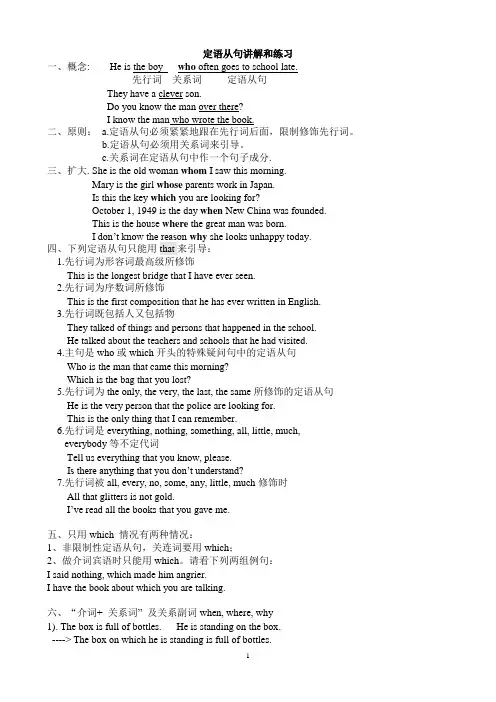
定语从句讲解和练习一、概念: He is the boy who often goes to school late.先行词关系词定语从句They have a clever son.Do you know the man over there?I know the man who wrote the book.二、原则: a.定语从句必须紧紧地跟在先行词后面,限制修饰先行词。
b.定语从句必须用关系词来引导。
c.关系词在定语从句中作一个句子成分.三、扩大. She is the old woman whom I saw this morning.Mary is the girl whose parents work in Japan.Is this the key which you are looking for?October 1, 1949 is the day when New China was founded.This is the house where the great man was born.I don’t know the reason why she looks unhappy today.四、下列定语从句只能用that来引导:1.先行词为形容词最高级所修饰This is the longest bridge that I have ever seen.2.先行词为序数词所修饰This is the first composition that he has ever written in English.3.先行词既包括人又包括物They talked of things and persons that happened in the school.He talked about the teachers and schools that he had visited.4.主句是who或which开头的特殊疑问句中的定语从句Who is the man that came this morning?Which is the bag that you lost?5.先行词为the only, the very, the last, the same所修饰的定语从句He is the very person that the police are looking for.This is the only thing that I can remember.6.先行词是everything, nothing, something, all, little, much,everybody等不定代词Tell us everything that you know, please.Is there anything that you don’t understand?7.先行词被all, every, no, some, any, little, much修饰时All that glitters is not gold.I’ve read all the books that you gave me.五、只用which 情况有两种情况:1、非限制性定语从句,关连词要用which;2、做介词宾语时只能用which。
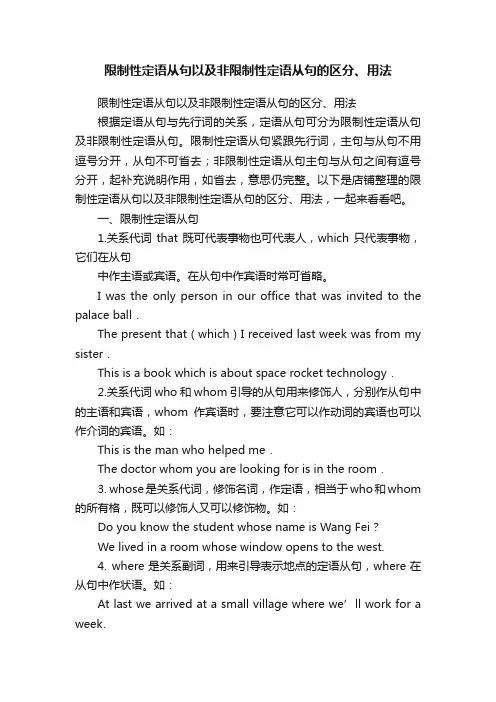
限制性定语从句以及非限制性定语从句的区分、用法限制性定语从句以及非限制性定语从句的区分、用法根据定语从句与先行词的关系,定语从句可分为限制性定语从句及非限制性定语从句。
限制性定语从句紧跟先行词,主句与从句不用逗号分开,从句不可省去;非限制性定语从句主句与从句之间有逗号分开,起补充说明作用,如省去,意思仍完整。
以下是店铺整理的限制性定语从句以及非限制性定语从句的区分、用法,一起来看看吧。
一、限制性定语从句1.关系代词that既可代表事物也可代表人,which只代表事物,它们在从句中作主语或宾语。
在从句中作宾语时常可省略。
I was the only person in our office that was invited to the palace ball.The present that(which)I received last week was from my sister.This is a book which is about space rocket technology.2.关系代词who和whom引导的从句用来修饰人,分别作从句中的主语和宾语,whom作宾语时,要注意它可以作动词的宾语也可以作介词的宾语。
如:This is the man who helped me.The doctor whom you are looking for is in the room.3. whose是关系代词,修饰名词,作定语,相当于who和whom 的所有格,既可以修饰人又可以修饰物。
如:Do you know the student whose name is Wang Fei?We lived in a room whose window opens to the west.4. where是关系副词,用来引导表示地点的定语从句,where在从句中作状语。
如:At last we arrived at a small village where we’ll work for a week.5. when是关系副词,引导定语从句表示时间,在从句中作状语。
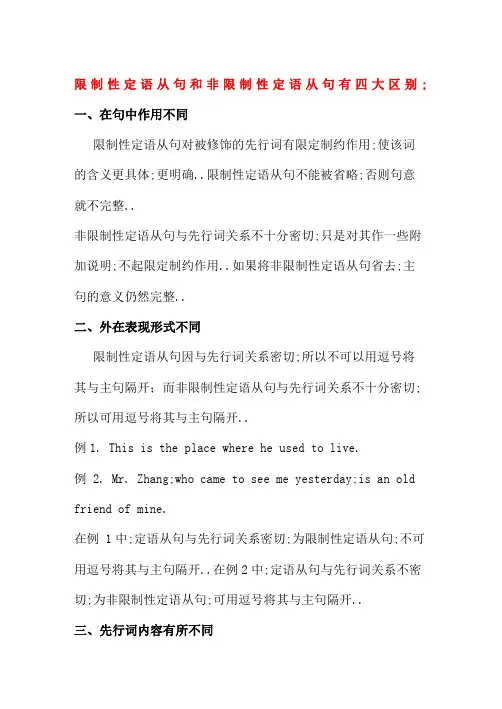
限制性定语从句和非限制性定语从句有四大区别;一、在句中作用不同限制性定语从句对被修饰的先行词有限定制约作用;使该词的含义更具体;更明确..限制性定语从句不能被省略;否则句意就不完整..非限制性定语从句与先行词关系不十分密切;只是对其作一些附加说明;不起限定制约作用..如果将非限制性定语从句省去;主句的意义仍然完整..二、外在表现形式不同限制性定语从句因与先行词关系密切;所以不可以用逗号将其与主句隔开;而非限制性定语从句与先行词关系不十分密切;所以可用逗号将其与主句隔开..例1. This is the place where he used to live.例 2. Mr. Zhang;who came to see me yesterday;is an old friend of mine.在例 1中;定语从句与先行词关系密切;为限制性定语从句;不可用逗号将其与主句隔开..在例2中;定语从句与先行词关系不密切;为非限制性定语从句;可用逗号将其与主句隔开..三、先行词内容有所不同大多数限制性和非限制性定语从句的先行词往往为某一个词或短语;而特殊情况下非限制性定语从句的先行词也可为整个主句;此时非限制性定语从句常由 which 引导..例:1. A middle-aged woman killed her husband;which frightened me very much.由语境可知;令“我”恐惧的内容应为“中年女子杀害了自己的丈夫”这整个一件事;因此先行词为整个主句;此时应由 which 引导定语从句..例:2. A five-year-old boy canspeak two foreign languages; which surprises all the people present.由语境可知;令所有在场的人感到惊讶的内容是“一个五岁男孩会讲两门外语”这整个一件事;因此先行词为整个主句;此时应由 which 引导非限制性定语从句..四、关系词的使用情况有所不同一 that 不可用于引导非限制性定语从句所有关系代词和关系副词均可引导限制性定语从句;大多数关系代词和关系副词可引导非限制性定语从句;但 that 不可..例如:他没通过这次考试;令我很失望..误:He didn't pass the exam;that disappointed me.正:He didn't pass the exam;which disappointed me.值得注意的是;不少同学误认为只有 which 才能引导非限制性定语从句;这个观点是不正确的..使用非限制性定语从句时;如果先行词指人;则用 who ; whom或 whose 引导非限制性定语从句;先行词指物可用 which 引导非限制性定语从句;先行词表时间或地点且在从句中作时间状语或地点状语时;可用when;where 引导非限制性定语从句..例1. We'll graduate in July;when we will be free.例2. Last Sunday they reached Nanjing;where a conference was to be held.二关系代词替代情况不同关系代词 whom 在限制性定语从句中作宾语时可用 who 代替 whom ;但 whom 在非限制性定语从句中作宾语时不可用 who 来代替..例: 1. This is the girl whom I met in the street.先行词 the girl 在限制性定语从句中作宾语;可用 who 代替whom .例: 2. A young man had a new girl friend;whom he wanted to impress.先行词 a new girl friend 在非限制性定语从句中作宾语;不可用 who 代替 whom .在限制性定语从句中;先行词指人时可用 that 代替 who/ whom ;但在非限制性定语从句中先行词指人时;不可用 that 代替who/whom .例:她有一个姐姐;她是教师..误: She has a sister;that is a teacher.正:She has a sister;who is teacher.三关系代词省略情况不同关系代词在限制性定语从句中作宾语时可以省去;非限制性定语从句的所有关系词均不可省..例 1. This is the bookwhich/thathe lost yesterday.先行词 the book 在限制性定语从句中作宾语;关系代词 which 或 that 可以省略..例 2. The book; which he lost yesterday; has been found.先行词 the book 在非限制性定语从句中作宾语;关系代词which 不可省..四as引导定语从句时的用法① as引导限制性定语从句通常用于the same … as; such … as 结构中..e.g. I want the same shirt as my friend’s.Such machines as are used in our workshop are made in China. 我们车间使用的这种机器是中国制造的..② as引导非限制性定语从句既可放在主句之前;也可放在主句之后;用来修饰整个句子..通常用下列句型:as is known to all; as is said; as is reported; as is announced; as we all know; as I expect 等..e.g. As I expected; he got the first place again in this mid-term examination.3as 引导非限制性定语从句时与which的区别① 当主句和从句语义一致时;用as;反之;用which来引导非限制性定语从句..e.g. He made a long speech; as we expected.He made a long speech; which was unexpected.② 当非限制定语从句为否定时;常用which引导..e.g. Tom drinks a lot every day; which his wife doesn’t likeat all.2. 定语从句有时不直接紧靠先行词;中间由一个定语、状语或谓语隔开..这种定语从句叫做分隔性定语从句e.g. There is an expression in his eyes that I can’t understand.4. 引导定语从句的关系副词有时可以用“介词+ which”来代替..e.g. October 1; 1949 was the day on which = when the People’s Republic of China was founded.5. 当定语从句中谓语动词是带介词或副词的固定短语动词时;短语动词的各个固定部分不要拆开..e.g. The sick man whom she is looking after is her father.6. 介词在关系代词前;只能用which和whom;且不能省略;介词在句尾;关系代词可以省略..定语从句练习、一、把下列每对句子合并成含有定语从句的主从复合句:1. The fan is on the desk. You want it.2. The man is in the next room. He brought our textbooks here yesterday.3. The magazine is mine. He has taken it away.4. The students will not pass the exam. They don’t study hard.5. The woman is our geography teacher. You saw her in the park.6. The letter is from my sister. I received it yesterday.7. The play was wonderful. We saw it last night.8. The train was late. It was going to Nanning.9. The boy is my brother. He was here a minute ago.10. The tree is quite tall. He is climbing it.11. Here is the girl. Her brother works in this shop.12. That’s the chi ld. We were looking at his drawing just now.13. This is the boy. His sister is a famous singer.14. I want to talk to the boys. Their homework haven’t been handed in.15. Is that the woman Her daughter is in my class.16. He used to live in a big house. In front of it grew many banana trees.17. They passed a factory. At the back of the factory there were rice fields.18. The soldier ran to the building. On the top of it flewa flag.19. In the evening they arrived at a hill. At the foot of the hill there was a temple.20. She came into a big room. In the middle of it stood a large table.二、根据句子意思;用介词+关系代词whom或which 完成下列句子.1. The person ________ ________ I spoke just now is themanager that I told you about.2. The pencil ________ ________ he was writing broke.3. Wu Dong; ________ ________ I went to the concert; enjoyed it very much.4. The two things ________ ________ Marx was not sure were the grammar and some of the idioms of English.5. Her bag; ________ ________ she put all her books; has not been found.6. The stories about the Long March; ________ ________ thisis one example; are well written.三、选择填空:1. The man ____ visited our school yesterday is from London.A. whoB. whichC. whomD. when2. The woman ____ is talking to my mother is a friend of hers.A. whoseB. whoC. whomD. which3. Because of my poor memory; all ____ you told me has been forgotten.A. thatB. whichC. whatD. as4. Do you remember those days ____ we spent along the seashore very happilyA. whenB. whereC. whichD. who5. Tom t took away the camera because it was just the samecamera ____ he lost last week.A. whichB. thatC. whomD. as6. Those ____ want to go please sign their names here.A. whomB. whichC. whoD. when7. Where is the man ____ I met this morningA. whenB. whereC. whichD. who8. Who is the woman ____ is sweeping the floor over thereA. whoB. /C. thatD. when9. The man ____ you talked just now is a worker.A. whoB. whomC. to whomD. to who10. The man ____ you are going to make friends is my father’s neighbour.A. with whomB. whenC. to whomD. which11. The doctor ____ is leaving for Africa next month.A. the nurse is talking to himB. whom the nurse is talkingC. the nurse is talking toD. who the nurse is talking12. The man ____ around our school is from America.A. which you showedB. you showed himC. you showedD. where you showed13. He talked about a hero ____ no one had ever heard.A. of whomB. from whomC. about thatD. who14. In fact the Swede did not understand the three questions____ were asked in French.A. whereB. whoC. in whichD. which15. Have you read the book ____ I lent to youA. thatB. whomC. whenD. whose16. Finally; the thief handed over everything ____ he had stolen to the police.A. thatB. whichC. whateverD. all17. The foreign guests; ____ were government officials; werewarmly welcomed at the airport.A. most of themB. most of thatC. most of whomD. most of those18. This is the very letter ____came last night.A. whoB. whichC. thatD. as19. I know only a little about this matter; you may ask ____ knows better than I.A. whoeverB. whomeverC. anyoneD. the one20. This is the school ____ we visited three days ago.A. whereB. /C. whenD. what21. This is the factory ____ we worked a year ago.A. whereB. thatC. whichD. on which22. Nearby were two canoes ____ they had come to the island.A. whichB. in whichC. thatD. /23. Jack is pleased with ____ you have given him and all ____ you have told him.A. that; whatB. what; thatC. which; whatD. that; which24. Do you work near the building ____ colour is yellowA. thatB. whichC. itsD. whose25. In the dark street; there wasn’t a single person ____ she could turn for help.A. whomB. whoC. to whomD. form whom26. Is this school ____ we visited three years agoA. the oneB. whichC. thatD. where27. Is this the school ____ we visited three years agoA. the oneB. whereC. in whichD. /28; How many students are there in your class ____ homes are in the countryA. whoseB. whoC. whomD. which29. Alice received an invitation from her boss; ____ cameas a surprise.A. itB. whichC. thatD. he30. The train was crowded and I had to get into a carriage____ already seven other people.A. when there wereB. which there wereC. that there wereD. where there were31. I live in the house ____ windows face south.A. whichB. whoseC. whereD. that32. ---- What game is popular with them---- The ____ most is tennis.A. game they like itB. game they likeC. best game they likeD. best game they like it33. They stayed with me three weeks; ____ they drank all the wine I had.A. whichB. which timeC. during whichD. during which time34. The room ____ Mr White lives is not very large.A. thatB. whichC. whereD. when35. Don’t forget the day ____ you were received into theYouth League.A. whenB. thatC. at whichD. where36. I’ve finished writing the novel; ____ is to be published next month.A. thatB. whatC. whichD. when37. He returned home safe and sound after a fierce battle; ____ was unexpected.A. whichB. asC. thatD. it38. ____ is known to all; English is not very difficult to learn.A. WhatB. AsC. ThatD. Which39. The old man had three sons; all of ____ died during World War Ⅱ.A. whoseB. thatC. whomD. who40. I have bought two pens; ____ write well.A. none of whichB. neither of whichC. both of whichD. all of which41. Do you know the reason ____ she has changed her mindA. whyB. whichC. for thatD. of which42. He failed in the exam; ____ proves that he wasn’t working hard enough.A. whichB. whatC. itD. that43. During the week ____ he tried to collect materials for his article.A. followingB. followedC. to followD. that followed44. ____ was expected; he succeeded in the exam.A. ItB. WhichC. AsD. That45. He studied hard and later became a well-known writer; ____ his father expected.A. that was whatB. what was thatC. and which wasD. which was what46. We should read such books ____ will make us better and wiser.A. whenB. asC. whoseD. what47. You must show my wife the same respect ____ you show me.A. whenB. asC. whoseD. what48. He is absent; ____ is often the case.A. whatB. whichC. whoD. as49. It is the first time ____ I have come to your city.A. thatB. whichC. whatD. when50. Who ____ has the same idea as it will do it in this way.A. whoB. thatC. whomD. which51. I shall never forget those years ____ I lived in thecountry with the farmers; ____ has a great effect on my life.A. that; whichB. when; whichC. which; thatD. when; who52. This is the only book ____ I can find.A. thatB. whichC. itD. with which53. I don’t like ____ you speak to her.A. the wayB. the way in thatC. the way whichD. the way of which54. That is one of those books that ____ worth reading.A. isB. areC. hasD. have55. This is the only one of the students whose handwriting ____ the best.A. isB. areC. hasD. have定语从句参考答案一、1. The fan that you want is on the desk.2. The man who brought our textbooks here yesterday is in next room.3. The magazine which he has taken away is mine.4. The students who don’t study hard will not pass the exam.5. The woman you saw in the park is our geography teacher.6. The letter I received yesterday is from my sister.7. The play that we saw last night was wonderful.8. The train which was going to Nanning was late.9. The boy who was here a minute ago is my brother.10. The tree he is climbing is quite tall.11. Here is the girl whose brother works in this shop.12. That’s the child whose drawing we were looking at just now.13. This is the boy whose sister is a favous singer.14. I want to talk to the boy whose homework hasn’t beenhanded in.15. Is that the woman whose daughter is in my class16. He used to live in a big house; in front of which grew many banana trees.17. They passed a factory; at the back of which there were rice fields.18. The soldier ran to the building; on the top of which flewa flag.19. In the evening they arrived at a hill; at the foot of which there was a temple.20. She came into a big room; in the middle of which stooda large table.二、1. to whom; 2. wiht which; 3. with whom;4. about which;5. in which;6. of which三、1~5 ABACD 6~10 CDCCA 11~15 CCADA 16~20 ACCAB21~25 ABBDC 26~30 ADABD 31~35 BBDCA 36~40 CABCC 41~45 AADCD 46~50 BBDAB 51. BAABA。
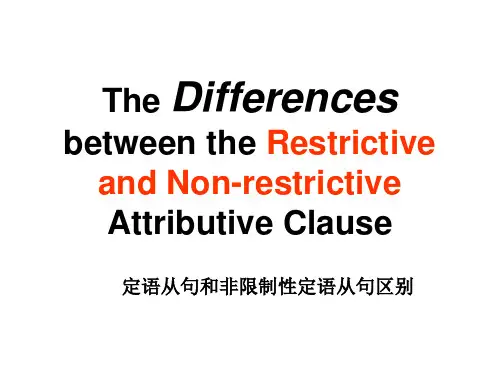
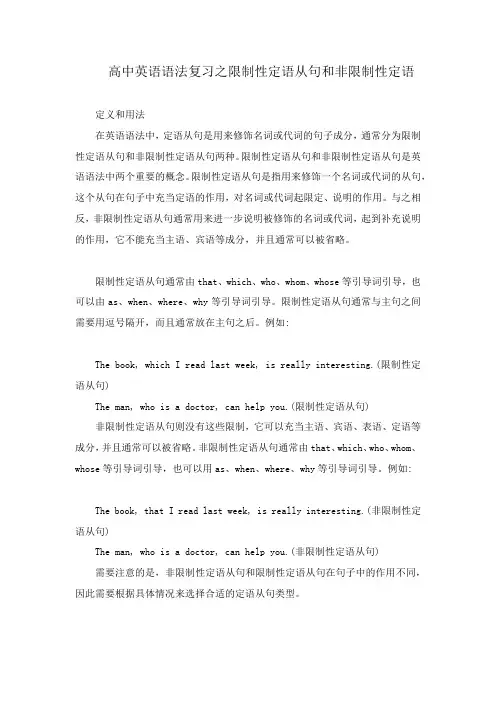
高中英语语法复习之限制性定语从句和非限制性定语定义和用法在英语语法中,定语从句是用来修饰名词或代词的句子成分,通常分为限制性定语从句和非限制性定语从句两种。
限制性定语从句和非限制性定语从句是英语语法中两个重要的概念。
限制性定语从句是指用来修饰一个名词或代词的从句,这个从句在句子中充当定语的作用,对名词或代词起限定、说明的作用。
与之相反,非限制性定语从句通常用来进一步说明被修饰的名词或代词,起到补充说明的作用,它不能充当主语、宾语等成分,并且通常可以被省略。
限制性定语从句通常由that、which、who、whom、whose等引导词引导,也可以由as、when、where、why等引导词引导。
限制性定语从句通常与主句之间需要用逗号隔开,而且通常放在主句之后。
例如:The book, which I read last week, is really interesting.(限制性定语从句)The man, who is a doctor, can help you.(限制性定语从句)非限制性定语从句则没有这些限制,它可以充当主语、宾语、表语、定语等成分,并且通常可以被省略。
非限制性定语从句通常由that、which、who、whom、whose等引导词引导,也可以用as、when、where、why等引导词引导。
例如:The book, that I read last week, is really interesting.(非限制性定语从句)The man, who is a doctor, can help you.(非限制性定语从句)需要注意的是,非限制性定语从句和限制性定语从句在句子中的作用不同,因此需要根据具体情况来选择合适的定语从句类型。
限制性定语从句是先行词在定语从句中充当主语或宾语,对先行词起修饰和限制作用,二者缺一不可。
限制性定语从句和非限制性定语从句是英语语法中的两个重要概念。
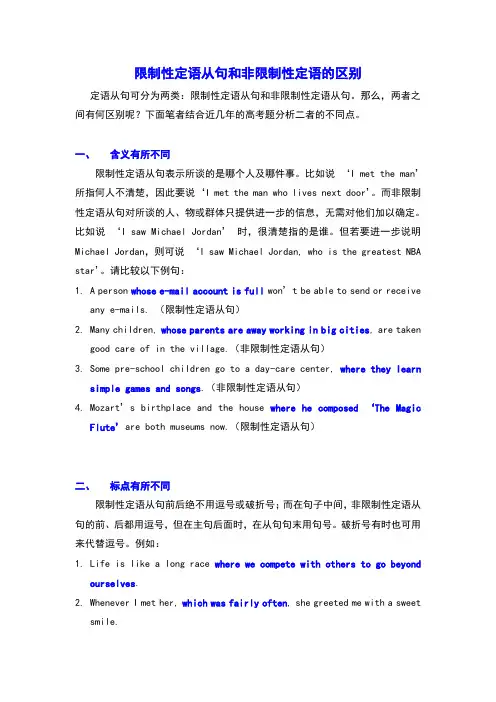
限制性定语从句和非限制性定语的区别定语从句可分为两类:限制性定语从句和非限制性定语从句。
那么,两者之间有何区别呢?下面笔者结合近几年的高考题分析二者的不同点。
一、含义有所不同限制性定语从句表示所谈的是哪个人及哪件事。
比如说‘I met the man’所指何人不清楚,因此要说‘I met the man who lives next door’。
而非限制性定语从句对所谈的人、物或群体只提供进一步的信息,无需对他们加以确定。
比如说‘I saw Michael Jordan’时,很清楚指的是谁。
但若要进一步说明Michael Jordan,则可说‘I saw Michael Jordan, who is the greatest NBA star’。
请比较以下例句:1.A person whose e-mail account is full won’t be able to send or receiveany e-mails. (限制性定语从句)2.Many children,whose parents are away working in big cities, are takengood care of in the village.(非限制性定语从句)3.Some pre-school children go to a day-care center,where they learnsimple games and songs.(非限制性定语从句)4.Mozart’s birthplace and the house where he composed ‘The MagicFlute’are both museums now.(限制性定语从句)二、标点有所不同限制性定语从句前后绝不用逗号或破折号;而在句子中间,非限制性定语从句的前、后都用逗号,但在主句后面时,在从句句末用句号。
破折号有时也可用来代替逗号。

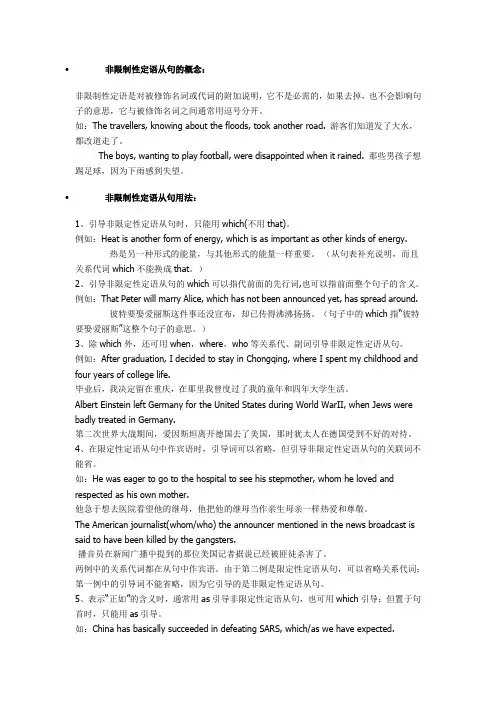
∙非限制性定语从句的概念:非限制性定语是对被修饰名词或代词的附加说明,它不是必需的,如果去掉,也不会影响句子的意思,它与被修饰名词之间通常用逗号分开。
如:The travellers, knowing about the floods, took another road. 游客们知道发了大水,都改道走了。
The boys, wanting to play football, were disappointed when it rained. 那些男孩子想踢足球,因为下雨感到失望。
∙非限制性定语从句用法:1、引导非限定性定语从句时,只能用which(不用that)。
例如:Heat is another form of energy, which is as important as other kinds of energy.热是另一种形式的能量,与其他形式的能量一样重要。
(从句表补充说明,而且关系代词which不能换成that。
)2、引导非限定性定语从句的which可以指代前面的先行词,也可以指前面整个句子的含义。
例如:That Peter will marry Alice, which has not been announced yet, has spread around.彼特要娶爱丽斯这件事还没宣布,却已传得沸沸扬扬。
(句子中的which指“彼特要娶爱丽斯”这整个句子的意思。
)3、除which外,还可用when,where,who等关系代、副词引导非限定性定语从句。
例如:After graduation, I decided to stay in Chongqing, where I spent my childhood and four years of college life.毕业后,我决定留在重庆,在那里我曾度过了我的童年和四年大学生活。
Albert Einstein left Germany for the United States during World WarII, when Jews were badly treated in Germany.第二次世界大战期间,爱因斯坦离开德国去了美国,那时犹太人在德国受到不好的对待。
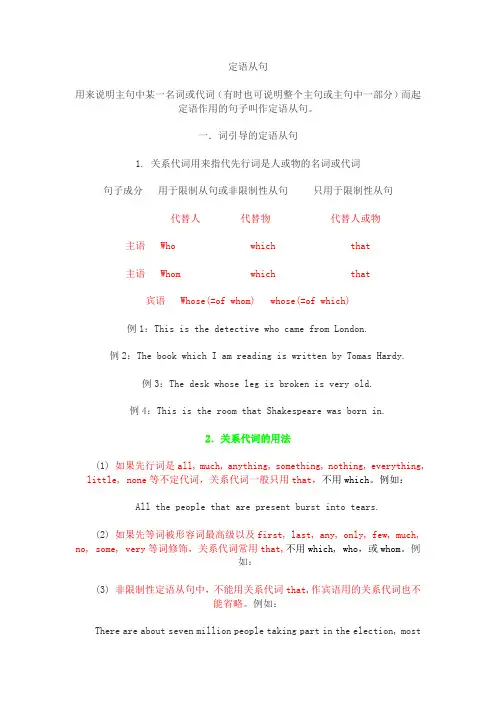
定语从句用来说明主句中某一名词或代词(有时也可说明整个主句或主句中一部分)而起定语作用的句子叫作定语从句。
一.词引导的定语从句1. 关系代词用来指代先行词是人或物的名词或代词句子成分用于限制从句或非限制性从句只用于限制性从句代替人代替物代替人或物主语 Who which that主语 Whom which that宾语 Whose(=of whom) whose(=of which)例1:This is the detective who came from London.例2:The book which I am reading is written by Tomas Hardy.例3:The desk whose leg is broken is very old.例4:This is the room that Shakespeare was born in.2.关系代词的用法(1) 如果先行词是all, much, anything, something, nothing, everything,little, none等不定代词,关系代词一般只用that,不用which。
例如: All the people that are present burst into tears.(2) 如果先等词被形容词最高级以及first, last, any, only, few, much, no, some, very等词修饰,关系代词常用that,不用which, who,或whom。
例如:(3) 非限制性定语从句中,不能用关系代词that,作宾语用的关系代词也不能省略。
例如:There are about seven million people taking part in the election, mostof whom、are well educated.(4) which还有一种特殊用法,它可以引导从句修饰前面的整个主句,代替主句所表示的整体概念或部分概念。
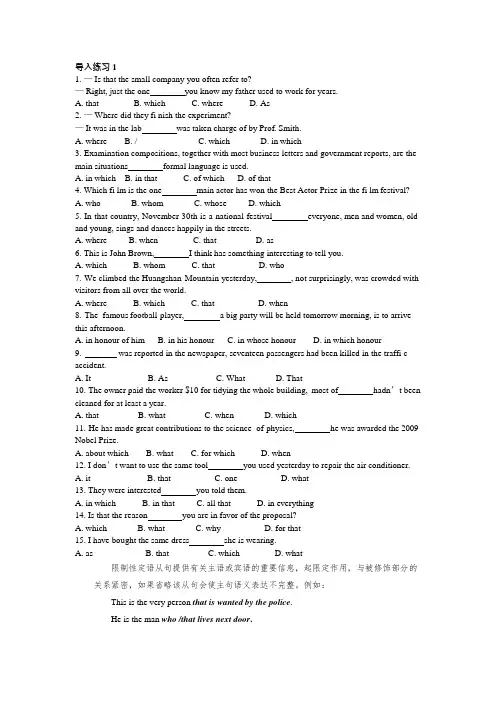
导入练习11.—Is that the small company you often refer to?—Right, just the one you know my father used to work for years.A.thatB. whichC. whereD. As2.—Where did they fi nish the experiment?—It was in the lab was taken charge of by Prof. Smith.A.whereB. /C. whichD. in which3.Examination compositions, together with most business letters and government reports, are the main situations formal language is used.A.in whichB. in thatC. of whichD. of that4.Which fi lm is the one main actor has won the Best Actor Prize in the fi lm festival?A.whoB. whomC. whoseD. which5.In that country, November 30th is a national festival everyone, men and women, old and young, sings and dances happily in the streets.A.whereB. whenC. thatD. as6.This is John Brown, I think has something interesting to tell you.A.whichB. whomC. thatD. who7.We climbed the Huangshan Mountain yesterday, , not surprisingly, was crowded with visitors from all over the world.A.whereB. whichC. thatD. when8.The famous football player, a big party will be held tomorrow morning, is to arrive this afternoon.A.in honour of himB. in his honourC. in whose honourD. in which honour9. was reported in the newspaper, seventeen passengers had been killed in the traffi c accident.A.ItB. AsC. WhatD. That10.The owner paid the worker $10 for tidying the whole building, most of hadn’t been cleaned for at least a year.A.thatB. whatC. whenD. which11.He has made great contributions to the science of physics, he was awarded the 2009 Nobel Prize.A.about whichB. whatC. for whichD. when12.I don’t want to use the same tool you used yesterday to repair the air conditioner.A.itB. thatC. oneD. what13.They were interested you told them.A.in whichB. in thatC. all thatD. in everything14.Is that the reason you are in favor of the proposal?A.whichB. whatC. whyD. for that15.I have bought the same dress she is wearing.A.asB. thatC. whichD. what限制性定语从句提供有关主语或宾语的重要信息,起限定作用,与被修饰部分的关系紧密,如果省略该从句会使主句语义表达不完整。
定语从句用来说明主句中某一名词或代词有时也可说明整个主句或主句中一部分而起定语作用的句子叫作定语从句..一.词引导的定语从句1. 关系代词用来指代先行词是人或物的名词或代词句子成分用于限制从句或非限制性从句只用于限制性从句代替人代替物代替人或物主语 Who which that主语 Whom which that宾语 Whose=of whom whose=of which例1:This is the detective who came from London.例2:The book which I am reading is written by Tomas Hardy.例3:The desk whose leg is broken is very old.例4:This is the room that Shakespeare was born in.2.关系代词的用法1 如果先行词是all; much; anything; something; nothing; everything;little; none等不定代词;关系代词一般只用that;不用which..例如:All the people that are present burst into tears.2 如果先等词被形容词最高级以及first; last; any; only; few; much; no; some; very等词修饰;关系代词常用that;不用which; who;或whom..例如:3 非限制性定语从句中;不能用关系代词that;作宾语用的关系代词也不能省略..例如:There are about seven million people taking part in the election; mostof whom、are well educated.4 which还有一种特殊用法;它可以引导从句修饰前面的整个主句;代替主句所表示的整体概念或部分概念..在这种从句中;which可以作主语;也可以作宾语或表语;多数情况下意思是与and this 相似;并可以指人..例如:He succeeded in the competition; which made his parents very happy.5 that可指人或物;在从句中作表语;指人作主语时多用who仅用于限制性定语从句中..6 which可作表语;既可指人;以可指物..指人时;一般指从事某种职业或是有种特征.品性或才能的人..Which引导的定语从句可以限制性的;也可以是非限制性的..7 如果作先作词的集体名词着眼于集体的整体;关系代词用which;若是指集体中的各个成员;则用who..8 先行词有两个;一个指人;一个指物;关系代词应该用that..例如:The boy and the dog that are in the picture are very lovely.9 如果先行词是anyone; anybody; everyone; everybody; someone;somebody;关系代词应该用 who 或whom;不用 which..例如:Is there anyone here who will go with youWhere:对于关系副词where的考察;趋于一种“地点的模糊化”..当先行词表示某人/物的situation;或某事发展的stage;或表达某事的某个方面时都可用关系副词where..常见的先行词还有point;case等..3.“介词+关系代词“是一个普遍使用的结构1 “介词+关系代词“可以引导限制性定语从句;也可以引导非限制性定语从句..“介词+关系代词“结构中的介词可以是 in; on; about; from; for; with; to at; of; without 等;关系代词只可用whom或 which;不可用 that ..in which =where for which =why on which = when2 from where为“介词+关系副词“结构;但也可以引导定语从句..例如:We stood at the top of the hill; from where we can see the town..3 像listen to; look at; depend on; pay attention to; take care of等固定短语动词;在定语从句中一般不宜将介词与动词分开..例如:This is the boy whom she has taken care of.二.关系副词引导的定语从句1.关系副词也可以引导定语从句关系副词在从句中分别表示时间.地点或原因..关系副词when在从句中充当时间状语;where 充当地点状语;why充当原因状语..2. that可引导定语从句表示时间.地点或原因That有时可以代替关系副词 when; where 或者why引导定语从句表示时间.地点或原因;在 that引导的这种定语从句中;that也可以省去..三.限制性定语从句与非限制性定语从句1.二者差异比较限制定语从句紧跟先行词;同先行词这间一般不加逗号;仅修饰先行词;可以由关系代词.关系副词或that来引导..非限制性定语从句仅作补充或说明;用逗号与主句隔开;既可修饰先行词;又可修饰整个主句;不可用that引导..2.关系代词和关系副词的选择依据1 弄清代替先行词的关系词在从句中作什么成分;作状语的应选用关系副词;作主语.宾语或表语的可选用关系代词..3. 先行词与定语从句隔离定语从句一般紧跟在先行词之后;但定语从句与先行词之间有时也会插入别的成分;构成先行词与定语从句的隔离..例如:1 This is the article written by him that Is poke to you about..2 He was the only person in this country who was invited四.As在定语从句中的用法1. 引导限制性定语从句和非限制性定语从句1as多与such 或the same连用;可以代替先行词是人或物的名词..2as 也可单独使用;引导非限制性定语从句;作用相当于which..例如:The elephant’s nose is l ike a snake; as anybody can see.3the same… that与the same …as在意思上是不同的..2.As引导的非限制性定语从句的位置as引导的非限制性定语从句位置较灵活;可以位于主句前面.中间或后面;一般用逗号与主句隔开;但which所引导的非限制性定语从句只能放在主句之后as is known众所周知;as is often the case情况常常如此;as is supposed 如所料想的;as often happens这种情况常常发生;as is expected在意料之中..例如:1 As is expected; the England team won the football match.2 The earth runs around the sun; as is known by everyone.众所周知; 定语从句可以分为限制性定语从句和非限制性定语从句..下面结合考例谈谈学习运用非限制性定语从句时应注意的几个问题:一、that不能用来引导非限制性定语从句..如:考例一She heard the terrible noise; ________brought her heart into her mouth.A. itB. whichC. thisD. that解析选B..后半句为非限制性定语从句;尽管先行词noise属于事物;也不能用that而要用which来引导..which指代noise;在从句中作主语..二、除which外;还可用when;where;whose;whom等引导非限制性定语从句;且各自的用法及差异与它们用在限制性定语从句时相同..如:Next month; when you'll spend your summer holidays in your hometown; is approaching. 下个月即将来临;届时你们将在家乡度暑假..关系副词when指代表示时间的名词next month;并作从句的状语..She is going to live in Macao; where she has some close friends. 她要到澳门去居住;在那里她有几个密友.. 关系副词where指代表示地点的名词Macao;并在从句中作状语..考例二Recently I bought an ancient Chinese vase; ________was very reasonable.A. which priceB. the price of whichC. its priceD. the price of whose解析选B..whose在从句中作表示所属关系的定语;既可指代人;也可指代物..指物时;常可转换为of which;指人时常可转换为of whom..考例三 In the office I never seem to have time until after 5:30 pm;______many people have gone home.A. whose timeB. thatC. on whichD. by which time解析先行词5:30 pm与time之间是一种同位关系;可用which来作定语替代..从句中的完成状态;常与by短语连用..故选D..三、在非限制性定语从句中作宾语的关系代词不能省略..如:He was eager to go to the hospital to see his stepmother; whom he loved as his own mother. 他迫切地想到医院去看望他的继母;他把继母当自己的亲妈妈一样爱戴..四、非限制性定语从句的关系代词which;既可以指代前面的先行词;也可以指代前面整句的含义..如:考例四 Dorothy was always speaking highly of her role in the play; of course;________made the others unhappy.A. whoB. whichC. thisD. what解析选B..指代“Dorothy总是高度评价自己在那场戏中所担任的角色”的整个事件..考例五Carol said the work would be done byOctober;________personally I doubt very much.A. itB. thatC. whenD. which解析表示时间的名词October;用“我个人非常怀疑”来修饰;意思不通..应该修饰整个主句; 表示对“Carol说在十月前能做好这项工作”怀疑..故选D..五、引导非限制性定语从句时as和which的差异:从句置于句首时;非限制性定语从句只能用as引导;而置于句末时;两者都可以使用.. 如:考例六________is known to everybody; the moon travels round the earth once every month.A. ItB. AsC. ThatD. What解析逗号表明为非限制性定语从句..选B..考例七________is mentioned above; the number of the students in senior high schools is increasing.A. WhichB. AsC. ThatD. It解析答案为B..与考例六同理..非限练习+详解1. The place _______interested me most was the Children's Palace.A. WhichB. whereC. whatD. in which2. Do you know the man _______A. whom I spokeB. to who spokeC. I spoke toD. that I spoke3. This is the hotel _______last month.A. which they stayedB. at that they stayedC. where they stayed atD. where they stayed4. Do you know the year ______the Chinese Communist Party was foundedA. whichB. thatC. whenD. on which5. That is the day ______I'll never forget.A. whichB. on whichC. in whichD. when6. The factory ______we'll visit next week is not far from here.A. whereB. to whichC. whichD. in which7. Great changes have taken place since then in the factory _______we are working.A. whereB. thatC. whichD. there8. This is one of the best films _______.A. that have been shown this yearB. that have shownC. that has been shown this yearD. that you talked9. Can you lend me the book ______the other dayA. about which you talkedB. which you talkedC. about that you talkedD. that you talked10. The pen ______he is writing is mine.A. with whichB. in whichC. on whichD. by which11.They arrived at a farmhouse; in front of ______sat a small boy.A. whomB. whoC. whichD. that12.The engineer ______my father works is about 50 years old.A. to whomB. on whomC. with whichD. with whom13.It there anyone in your class ______family is in the countryA. whoB. who'sC. whichD. whose14.I'm interested in ______you have said.A. all thatB. all whatC. thatD. which15.I want to use the same dictionary ______was used yesterday.A. whichB. whoC. whatD. as16.He isn't such a man ______he used to be.A. whoB. whomC. thatD. as17.He is good at English; ______we all know.A. thatB. asC. whomD. what18.Li Ming; ______to the concert enjoyed it very much.A. I went withB. with whom I wentC. with who I wentD.I went with him19.I don't like ______ as you read.A. the novelsB. the such novelsC. such novelsD. same novels20.He talked a lot about things and persons ________they remembered in the school.A. whichB. thatC. whomD. what21.The letter is from my sister; ______is working in Beijing.A. whichB. thatC. whomD. who22.In our factory there are 2;000 workers; two thirds of ____are women.A. themB. whichC. whomD. who23.You're the only person ______I've ever met ______could do it.A. who;/B./; whomC. whom;/D./; who24.I lost a book; ______I can't remember now.A. whose titleB. its titleC. the title of itD. the title of thatst summer we visited the West Lake; ______Hangzhou is famous in the world.A. for whichB. for thatC. in whichD. what26.I have bought such a watch _______ was advertised on TV.A. thatB. whichC. asD. it27.I can never forget the day _______ we worked together and the day ______ we spent together.A. when; whichB. which; whenC. what; thatD. on which; when28.The way ______he looks at problems is wrong.A. whichB. whoseC. whatD./29.This is the reason ______he didn't come to the meeting.A. in whichB. with whichC. thatD. for which30.This machine; ______for many years; is still working perfectly.A. after which I have lookedB. which I have looked afterC. that I have looked afterD. I have looked after31.The reason ______he didn't come was ______he was ill.A. why; thatB.that;whyC. for that;thatD.for which;what32.He is working hard; ______will make him pass the final exam.A.thatB.whichC.for whichD.who33.That is not the way ______I do it.A./B.whichC.for whichD.with which34.I have two grammars; ______are of great use.A. all of whichB. either of whichC. both of thatD. both of which35.I want to use the same tools _______used in your factory a few days ago.A. as wasB. which wasC. as wereD. which36.My neigh bours used to give me a hand in time of trouble; _______ was very kind of them.A. whoB. whichC. thatD. it37.This is the magazine _______ I copied the paragraph.A. thatB. whichC. from thatD. from which38.He is not such a man _______ would leave his work half done.A. thatB. whichC. whoD. as39. You can depend on whatever promise _______ he makes.A. /B. whyC. whenD. whose40. Smoking; _______ is a bad habit; is; however; popular.A. thatB. whichC. itD. though41. --- Did you ask the guard _______ happened--- Yes; he told me all _______ he knew.A. what; thatB. what; whatC. which; whichD. that; that42. I shall never forget those years _______ I lived on the farm withthe farmers; _______ has a great effect on my life.A. when; whoB. that; whichC. which; thatD. when; which43. The number of the people who _______ cars _______ increasing.A. owns; areB. owns; isC. own; isD. own; are44. During the days ________; he worked as a servant at the Browns.A. followedB. followingC. to followD. that followed45. Is oxygen the only gas _______ helps fire burnA. thatB. /C. whichD. it46. The clever boy made a hole in the wall; _______ he could see _____ was going on inside house.A. which; whatB. through which; whatC. through that; whatD. what; that47. Is _______ some German friends visited last weekA. this schoolB. this the schoolC. this school oneD. this school where48. John got beaten in the game; _______ had been expected.A. asB. thatC. whatD. who49. I have bought two ballpens; _______ writes well.A. none of themB. neither of themC. neither of whichD. none of which50. All that can be eaten _______ eaten up.A. are beingB. has beenC. had beenD. have been参考答案及解析1. A. which用作关系代词;在定语从句中作主语..2.C. "和谁讲话”要说speak to sb. 本题全句应为Do you know the man whom I spoke to...whom是关系代词;作介词to的宾语;可以省略..3. D. where是关系副词;表示地点;在定语从句中作地点状语..4. C. when是关系副词;表示时间;在定语从句中作时间状语..5.A. which是关系代词;在从句中作forget的宾语..其他几个答案都不能作宾语..6.C. 解析同第5题..7. A. 解析见第3题..8. A. 本句话的先行词应该是films;因此;关系代词that是负数概念;其谓语动词应用复述的被动语态have been shown..如果句中的one前面使用了定冠词the;则the one应该视为先行词..9. A. “谈到某事物”应说talk about sth...about是介词;其后要用which作宾语;不能用that..10. A. with which是"介词+关系代词"结构;常用来引导定语从句.with 有"用"的意思;介词之后只能用which;不能用that. with which在定语从句中作状语;即he is writing with a pen.11. C. in front of which 即in front of a farmhouse. In front of which 在从句中作状语.12. D. with whom引导定语从句.with whom放在从句中即为:my father works with the engineer.13. D. whose引导定语从句;在从句中作主语family的定语.14. A. that引导定语从句;因为先行词是all;所以只能选用that引导.15. D. the same……..as是固定用法; as引导定语从句时;可以作主语;宾语或表语.在本句话中;as作从句的主语.16. D. such……… as是固定用法;as引导定语从句时;可以作主语;宾语或表语.在本题中;as作表语.17. B. as作关系代词可以单独用来引导非限制性定语从句..这时as所指代的不是主句中某个名词;而往往指代整个主句的含义..as在从句中可以作主语、宾语..从句可放在主句后;也可置于主句前..在本句中;as作宾语.18. B. Li Ming enjoyed it very much是主句;with whom I went to the concert是定语从句.with whom放在从句中为:I went to the concert with Li Ming.19. C. as引导定语从句时通常构成such…as或the same…as固定搭配;其中such和same修饰其后的名词;as为关系代词;指代其前的名词引导定语从句.. as在从句中可以作主语、表语或宾语..Such修饰单数名词时;要用such a……..;本题中such books; such直接修饰复数名词.20. B. things和persons是先行词.当定语从句要修饰的先行词是既表示人;又表示物的名词时;其关系代词要用that.21. D. who引导非限制性定语从句;who作从句的主语.22. C. two thirds of whom 即:two thirds of the 2;000 workers.23. D. 先行词person后有两个定语从句;第一个从句省略了关系代词whom.因为; whom作从句中met的宾语;可以省略.第二个从句who could do it.who在从句中作主语;不可省略.24. A. whose title引导非限制性定语从句;whose title也可以说成the title of which25. A. for which 引导定语从句;使用介词for;是来自于从句中的固定短语 be famous for "以……..而闻名".26. C. 当先行词被such修饰时;引导定语从句的关系代词要用as. As在本从句中作主语.27. A. 两个先行词the day都是表示时间的名词;但第一个空白处要填的关系词在从句中作状语;因此要用关系副词when. 第二个空白处要填的关系词在从句中作动词spent的宾语;因此要用关系代词which或that来引导定语从句.28. D. 在way、distance、direction等词后的定语从句中;常用that来代替“in 或其他介词+which”、when或where;而that常可省略..29. D. for which在定语从句中作原因状语;可用why 来替代.30. B. which I have looked after 构成一个非限制性定语从句.31. A. The reason why… was that….已成为一种固定句型;这一句中的why和that不能随意换位;也不能将that改成because;尽管that这个词在译文中可能有“因为”的含义..32. B. 非限制性定语从句常用which引导;which表示前句话的整个含义.33. A. 解释见28题.34. D. 主句中的two表明不能选A.从句中的are表明不能选B. both of which用来引导非限制性定语从句.35. C. as引导定语从句时通常构成such…as或the same…as固定搭配;其中such和same修饰其后的名词;as为关系代词;指代其前的名词引导定语从句..as在从句中可以作主语、表语或宾语..本题中as作从句的主语.36. B. 非限制性定语从句常用which引导;which表示前句话的整个含义.37. D.38. D. 解析见35题.39. A. he makes是定语从句; 从句前省略了关系代词that.40. B. which is a bad habit 非限制性定语从句.41. A. what happened是宾语从句. all 之后that he knew是定语从句.先行词是all;所以关系代词只能用that.42. D. years是表示时间的名词;用when引导定语从句;是因为when在从句中作时间状语.第二个空选用which;引导一个非限制性定语从句.43. C. 本句话的定语从句是who own cars. 其先行词是people;因此;定语从句的谓语动词要用复数的own..本句话主句的主语是The number of 指“…..的数目”;是单数概念..因此;主句的谓语动词要用is..44. D. that followed是定语从句;关系代词that在从句中作主语..45. A. 先行词gas被only修饰;关系代词要用that;而不用which..46. B. through which引导定语从句;through which即through the hole;在定语从句中作状语..What引导的是see的宾语从句;并作从句的主语..47. B. 为便于理解;改写本句话:This is the school that some Germanfriends visited last week. 不难看出;作表语的the school是先行词..that引导了定语从句;因为that同时又作visited的宾语;所以被省略了..其它选项结构不对..48. A. 解释见35题..49. C. 因为是two ballpens; 并且定语从句的谓语writes是单数概念..因此;C是正确选项..50. B. 本句话中;主句的主语是all;为抽象概念..因此;其谓语应用单数的has been..关系代词that引导定语从句;并在从句中作主语..。
非限定性定语从句起补充说明作用,非限定性定语从句起补充说明作用,缺少也不会影响全句的理解,缺少也不会影响全句的理解,缺少也不会影响全句的理解,在非限定性定在非限定性定语从句的前面往往有逗号隔开,语从句的前面往往有逗号隔开,如若将非限定性定语从句放在句子中间,如若将非限定性定语从句放在句子中间,如若将非限定性定语从句放在句子中间,起前后起前后都需要用逗号隔开。
都需要用逗号隔开。
目录目录关系词使用规则及注意事项限定性定语从句与非限定性定语从句的区别功能和形式方面的区别编辑本段关系词①引导非限定性定语从句的①引导非限定性定语从句的关系代词关系代词:指代对象对象指代人 指代物指代物 主格主格who which,as 宾格宾格whom which,as 所有格 of wh om, whose which, of which, whose②引导非限定性定语从句的关系副词主要有:②引导非限定性定语从句的关系副词主要有:when,where when,where编辑本段使用规则及注意事项1. which 引导的非限定性定语从句是用来说明前面整个句子的情况或主句的某一部分。
主句的某一部分。
2. 2. 在引导非限定性定语从句时,在引导非限定性定语从句时,that 有时相当于in which, for which 或at which which 。
其中,介词的选用,依据从句中的动词所需搭配的介词来选。
其中,介词的选用,依据从句中的动词所需搭配的介词来选用。
用。
例句:例句:①Attitudes towards daydreaming are changing in much the same way that(in which) attitudes towards night dreaming have changed. way that(in which) attitudes towards night dreaming have changed. 人们对白日做梦的态度正在改变,这与人们对夜间做梦的看法的变化有非常相似之处。
限制性定语从句与非限制性定语从句区别限制性定语从句和非限制性定语从句是英语语法中两个常见的修饰方式,它们在使用时有着明显的区别。
本文将从结构、用途以及标点方面来详细探讨这两者之间的区别。
一、结构区别限制性定语从句是相对较为简洁的从句,它通常用来对先行词进行必要的限定和说明,去除了该从句对主句的某种修饰信息,整个句子也能够保持完整的意义。
限制性定语从句没有逗号与主句隔开,且无法省略。
例如:1. The book that I bought yesterday is on the table.(我昨天买的那本书在桌子上。
)在上述例句中,“that I bought yesterday”是一个限制性定语从句,修饰先行词“book”。
如果去除这个从句,则句子变为“The book is on the table.”(那本书在桌子上),这个句子的意义和完整性就会丧失。
非限制性定语从句较为独立,它用于对先行词进行额外的说明和补充,但去掉后不会对句子整体造成影响。
非限制性定语从句通常用逗号与主句隔开,在语法上并非必需部分。
例如:1. Tom, who is my best friend, is coming to visit tomorrow.(汤姆,我的好朋友,明天要来访问。
)在上述例句中,“who is my best friend”是一个非限制性定语从句,对先行词“Tom”进行了额外的说明。
即使去掉这个从句,句子仍然完整并且意义明确。
二、用途区别限制性定语从句通常用来对先行词进行修饰和限定,没有它的话,句子的意义就不完整或者模糊。
它提供了限定先行词的关键信息,使读者或者听者能够准确地理解句子的含义。
非限制性定语从句则是对先行词进行额外说明补充,提供了一些有关先行词的附加信息,但去掉后不会影响整个句子的意义。
三、标点区别限制性定语从句和非限制性定语从句的标点使用也有着明显的区别。
限制性定语从句通常没有逗号,与主句紧密相连,形成一个完整的句子。
非限制性定语从句及限制性定语从句语法知识点与相关练习语法知识点非限定性定语从句起补充说明作用,缺少也不会影响全句的理解,在非限定性定语从句的前面往往有逗号隔开,如若将非限定性定语从句放在句子中间,起前后都需要用逗号隔开。
①引导非限定性定语从句的关系代词:指代对象指代人指代物主格who which,as宾格whom which,as所有格of whom, whose which, of which, whose②引导非限定性定语从句的关系副词主要有:when,where使用规则及注意事项1. which引导的非限定性定语从句是用来说明前面整个句子的情况或主句的某一部分。
2. 在引导非限定性定语从句时,that有时相当于in which, for which或at which 。
其中,介词的选用,依据从句中的动词所需搭配的介词来选用。
例句:①Attitudes towards daydreaming are changing in much the same way that(in which) attitudes towards night dreaming have changed.人们对白日做梦的态度正在改变,这与人们对夜间做梦的看法的变化有非常相似之处。
②I like the music for the very reason that(for which) he dislike it.我出于某种原因喜欢这种音乐,而他恰恰与我相反。
③We arrived the day that(on which) they left.刚好我们到的那天他们走了。
3. as有时也可用作关系代词。
4. 在非限定性定语从句中,关系词不能用that。
区别1.限定性定语从句: 从句不能省略,如果省略整个句子意思不完整。
非限定性定语从句: 从句可以省略,如果省略整个句子意思仍然完整。
2.限定性定语从句: 先行词可以用that 引导。
为⼤家整理的限制性定语和⾮限制性定语从句怎么区分,供⼤家学习参考!限制性定语从句:限制性定语从句对先⾏词起限制、修饰的作⽤,关系代词有that,which,whom,who,whose以及关系副词when,where等,没有明显的逗号把从句与主语分开,表达的意思为被修饰词的⼀个定语。
例句:Do you know the professor who is speaking at the meeting?Where is the book which I bought this morning?⾮限制性定语从句:作⽤相当于⼀种插⼊语或者对先⾏词的⼀种解释,和先⾏词之间只有⽐较松散的关系,⽂字中常常⽤逗号将其与主句分开,⽤法其实与限制性定语从句极为相似,只是不能⽤that做修饰词。
例句:This letter is from his parents, who are working in Tibet.Englishi is an important subject, which every students should study well.The building, in front of which sat a boy, was a school.⼀、定语从句有限制性和⾮限制性两种。
限制性定语从句是先⾏词不可缺少的部分,去掉它主句意思往往不明确;⾮限制性定语从句是先⾏词的附加说明,去掉了也不会影响主句的意思,它与主句之间通常⽤逗号分开,例如:This is the house which we bought last month. 这是我们上个⽉买的那幢房⼦。
(限制性)The house, which we bought last month, is very nice.这幢房⼦很漂亮,是我们上个⽉买的。
(⾮限制性)2) 当先⾏词是专有名词或物主代词和指⽰代词所修饰时,其后的定语从句通常是⾮限制性的,例如:Charles Smith, who was my former teacher, retired last year. 查理·史密斯去年退休了,他曾经是我的⽼师。
非限制性定语从句及限制性定语从句语法知识点与相关练习语法知识点非限定性定语从句起补充说明作用,缺少也不会影响全句的理解,在非限定性定语从句的前面往往有逗号隔开,如若将非限定性定语从句放在句子中间,起前后都需要用逗号隔开。
①引导非限定性定语从句的关系代词:指代对象指代人指代物主格who which,as宾格whom which,as所有格of whom, whose which, of which, whose②引导非限定性定语从句的关系副词主要有:when,where使用规则及注意事项1. which引导的非限定性定语从句是用来说明前面整个句子的情况或主句的某一部分。
2. 在引导非限定性定语从句时,that有时相当于in which, for which或at which 。
其中,介词的选用,依据从句中的动词所需搭配的介词来选用。
例句:①Attitudes towards daydreaming are changing in much the same way that(in which) attitudes towards night dreaming have changed.人们对白日做梦的态度正在改变,这与人们对夜间做梦的看法的变化有非常相似之处。
②I like the music for the very reason that(for which) he dislike it.我出于某种原因喜欢这种音乐,而他恰恰与我相反。
③We arrived the day that(on which) they left.刚好我们到的那天他们走了。
3. as有时也可用作关系代词。
4. 在非限定性定语从句中,关系词不能用that。
区别1.限定性定语从句: 从句不能省略,如果省略整个句子意思不完整。
非限定性定语从句: 从句可以省略,如果省略整个句子意思仍然完整。
2.限定性定语从句: 先行词可以用that 引导。
导入练习11. —Is that the small company you often refer to?—Right, just the one _______ you know my father used to work for years.A.thatB. whichC. whereD. As2. —Where did they fi nish the experiment?—It was in the lab _______ was taken charge of by Prof. Smith.A. whereB. /C. whichD. in which3. Examination compositions, together with most business letters and government reports, are the main situations _______ formal language is used.A. in whichB. in thatC. of whichD. of that4. Which fi lm is the one _______ main actor has won the Best Actor Prize in the fi lm festival?A. whoB. whomC. whoseD. which5. In that country, November 30th is a national festival _______ everyone, men and women, old and young, sings and dances happily in the streets.A. whereB. whenC. thatD. as6. This is John Brown, _______ I think has something interesting to tell you.A. whichB. whomC. thatD. who7. We climbed the Huangshan Mountain yesterday, _______, not surprisingly, was crowded with visitors from all over the world.A. whereB. whichC. thatD. when8. The famous football player, _______ a big party will be held tomorrow morning, is to arrive this afternoon.A. in honour of himB. in his honourC. in whose honourD. in which honour9. _______ was reported in the newspaper, seventeen passengers had been killed in the traffi c accident.A. ItB. AsC. WhatD. That10. The owner paid the worker $10 for tidying the whole building, most of _______ hadn’t been cleaned for at least a year.A. thatB. whatC. whenD. which11. He has made great contributions to the science of physics, _______ he was awarded the 2009 Nobel Prize.A. about whichB. whatC. for whichD. when12. I don’t want to use the same tool _______ you used yesterday to repair the air conditioner.A. itB. thatC. oneD. what13. They were interested _______ you told them.A. in whichB. in thatC. all thatD. in everything14. Is that the reason _______ you are in favor of the proposal?A. whichB. whatC. whyD. for that15. I have bought the same dress _______ she is wearing.A. asB. thatC. whichD. what限制性定语从句提供有关主语或宾语的重要信息,起限定作用,与被修饰部分的关系紧密,如果省略该从句会使主句语义表达不完整。
例如:This is the very person that is wanted by the police.He is the man who /that lives next door.非限制性定语从句只是用来对被修饰部分作补充性的说明,与先行词关系比较松散,先行词与从句间可以用逗号隔开,从句可略去:The minister, who is to visit our university, is said to be a Qinghua University graduate.The businessman, whose suitcase has been found by a stranger, has left for Beijing.如果定语从句的先行词是专有名词或是带有形容词性物主代词(my, his, etc)或形容词性指示代词(this, that, etc)作限定词的名词词组,其后的定语从句通常为非限制性的。
例如:My mother, who has been on a visit to Australia, will fly back tomorrow..限制性定语从句的先行词只能是名词,代词或名词性词组,而非限制性定语从句的先行词除了是名词及名词性词组外,还可能是句子的一部分或是整个句子。
例如:They say he plays truant, which he doesn’t. [which指代plays truant]The meeting was put off till next month, as we hoped. [as指前面的句子]下面的表格归纳了前面已提到的两者不同之处:表一:限制性定语从句与非限制性定语从句的区别限制性定语从句非限制性定语从句1.提供确定或限定主句中某个名词的信息。
1.提供对确定主句中某个名词的非主要附加信息。
2.由深层嵌入句派生而来。
2.由两个独立的深层嵌入句派生而来。
3.无分隔定语从句和主句和停顿或特殊标点符号(逗号/插入语/破折号)。
3.书面语中用逗号,口语中用特殊的停顿和降低声调来把定语从句和主句分隔开来。
4.不可以修饰整个命题,只修饰一个名词。
4.可以修饰一个中心名词,或以评价的形式修饰整个命题。
5.可使用that和who(m),which等关系代词。
5.That不能当作关系代词,只可用wh-代词。
6.不常用来修饰专有名词。
6.既可修饰普通名词,也可修饰专有名词。
7.可修饰带有any 或every等类属限定词的中心名词。
7.不可修饰带有any 或every等类属限定词的中心名词。
as的用法1、as引导限制性定语从句时,常与such或the same连用,构成the same…as; such…as结构,as用于代替指人或物的先行词。
例如:I have never eaten such tasty foods as she cooked me.试比较the same…as和the same…that:This is the same book as I read last week.(这和我上周读的那本书是一样的。
)This is the same book that I read last year.(这就是我上周读的那本书。
)如果先行词表示抽象概念,则没有这种区别,例如:She told me the same story as/that she had told you.在as/so…as结构中,后面的as也是关系代词,例如:We took as many men as could be permitted to attend the meeting.2、引导非限制性定语从句关系代词as引导非限制性定语从句时,用于代替整个主句,意思是“正如”,相当于and this或and that。
as从句位置较之which引导的非限制性定语从句更加灵活,因而as从句既可以指前面提到的内容,也可以指后面将要提到的内容,which一般在主句后。
例如:The test is cancelled, as you have hoped.The test, as you have hoped, is cancelled.▲注:as代表前面的整个主句并在从句中做主语时表达的意思应与主句一致,而且从句中的谓语必须是系动词;若为行为动词,则从句中的关系代词只能用which.例如:He failed to pass the exam again, as is predicted.He failed to pass the exam again, which annoyed his mother greatly.记住以下的as结构:as is known to all (众所周知),as is often the case (情况常常如此),as the name Indicates/suggests (顾名思义),as may be imagined (可以想象得出),as often happens (这种情况常常发生),as has been said before (如前所述),as has been pointed out (正如已经指出的),as will be shown in ( 将在…中指出),as is hoped ( 正如所希望的)3 介词+ 关系代词“介词+ 关系代词”引导的定语从句既可以是限制性定语从句,又可以是非限制性定语从句,“介词+关系代词”在从句中做主语、宾语、状语、定语等,介词的选择则要根据它与其先行词的关系或前后名词、动词等的搭配关系来决定,同时还应该考虑句子在上下文中要表达的意思。